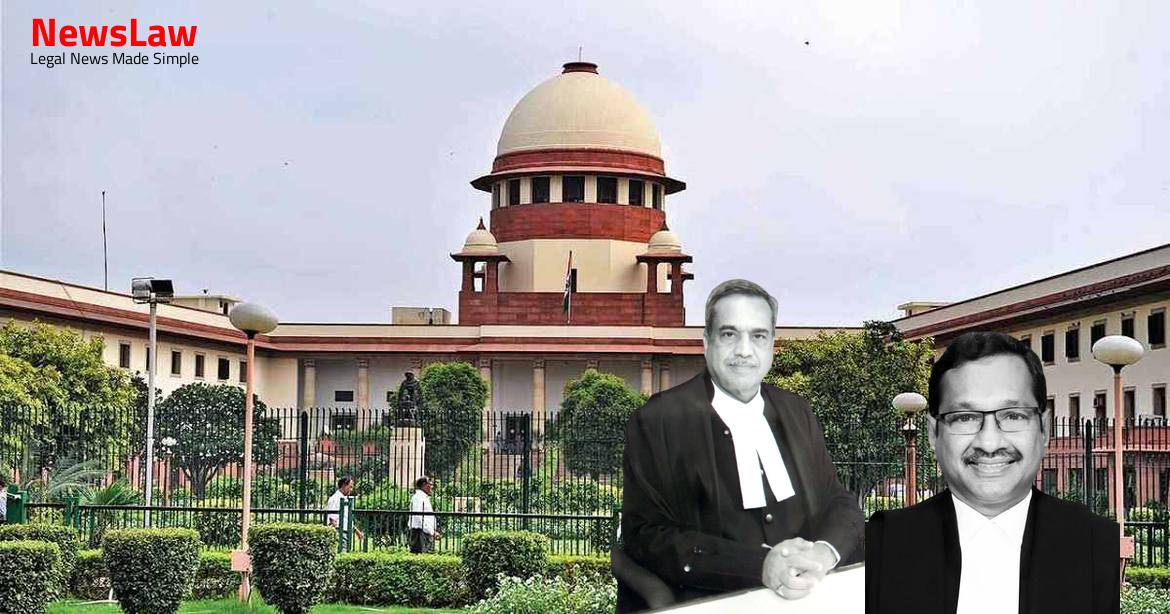The Supreme Court of India delivered a groundbreaking judgement in the case involving GNIDA and Village Saini, highlighting the vital importance of safeguarding village commons and natural water bodies. This case sets a precedent for upholding environmental conservation efforts and protecting the fundamental rights of local communities.
Facts
- Appellant showed through revenue records that certain lands were ponds and canals.
- Acquired lands including local ponds were leased to private industrialists without proper environmental clearances.
- Appellant complained to authorities about the negative impact on environment and human health.
- Villagers objected to the leasing of ponds and GNIDA started developing alternate waterbodies.
- Appellant contended that the water bodies were vested in Gram Sabhas and GNIDA had no power to transfer them.
- Appellant filed a statutory appeal against NGT’s order dismissing his grievance without proper adjudication.
- NGT’s order was based on GNIDA’s claim of developing bigger water-bodies as alternatives.
- Appellant, a resident of village Saini, approached NGT seeking adjudication of environmental issues regarding the illegal allotment of water bodies.
- During proceedings, NGT observed the construction of an alternate pond and concluded that appellant’s grievance had been redressed.
- Appellant amended his prayers in the Original Application to challenge all illegalities concerning village commons.
- NGT disposed of the matter without considering the full scope of appellant’s prayers.
- Appellant’s representation for action on illegal allotments was not addressed, leading to Sharp’s attempt at dispossession.
- Appellant contended that large tracts of the village had been acquired for industrial development, challenging the NGT’s summary dismissal.
Also Read: Ensuring Justice: Amanatullah Khan vs. Commissioner of Police, Delhi – A Landmark Case
Arguments
- The appellant argued that the disputed pond is in an arid zone with a low-water table near the Aravali hills, making it crucial for the survival of the sparse flora and fauna in the region.
- A Government Order from 03.06.2016 cited by GNIDA allowed destruction of ponds under certain circumstances with a requirement to develop 25%-larger alternate water bodies.
- The case of Chigurupati Venkata Subbayya v. Palaguda Anjayya was referenced to emphasize that communal rights in the land cannot be abolished even with significant changes in ownership or control.
- Under the NGT Act, the nature of appeal is akin to a second appeal as specified in the CPC, 1908, focusing on a singular substantive question of law.
- The appellant disputed the classification of Khasra Nos. 552 and 490 as ‘pokhar’, arguing that they were merely low-lying lands with occasional water accumulation during the rainy season.
- GNIDA alleged that the appellant’s dispute was a ploy to obstruct development for personal gain through cattle grazing, and questioned the legitimacy of the appellant’s claims.
- The appellant criticized the hasty disposal of his application and the lack of proper inquiry by the NGT, leading to illegal benefits to third parties at the expense of the environment and local residents.
- Reference was made to a new Code stating that all lands, including lakes and ponds, vest in the State Government, reaffirming the importance of state intervention to protect the environment.
- The appellant accused authorities of colluding with industrialists and real estate companies, neglecting their duties and breaching the public trust by allowing unchecked urbanization in ecologically sensitive areas.
- Seeking intervention from the Court, the appellant emphasized the constitutional right to a wholesome environment under Article 21, and the duty of the State to protect the environment under Article 48A and Article 51-A(g).
- Sharp argues that the disputed land no longer belongs to the Gram Sabha as per the UP Zamindari Abolition and Land Reforms Act, 1950 being repealed by the UP Revenue Code, 2006.
Also Read: State of Kerala vs. Union of India: Fiscal Responsibility Case
Analysis
- Authorities cannot contradict the record without empirical support
- Repeal of laws does not change nature of land contrary to revenue records
- Government Order of 2016 cannot be applied retrospectively
- Protection of village commons is essential for safeguarding fundamental rights
- Village commons sustain various chores and provide necessary resources
- Water bodies are vital sources of fishery and potable water
- Responsibility of respondents to protect environment and livelihood sources
- Necessity to develop disused ponds to prevent ecological disasters
- All persons have a right to a healthy environment under the Constitution
- Various directions issued for eviction of illegal occupants and restoration of common land
- Illegal takeover of community resources by few is illegal and needs protection
- Destruction of lakes affects vegetation and groundwater levels
- Mechanical application of environmental protection by allowing destruction of water bodies
- Exception of ‘huge projects/works’ in extraordinary circumstances to non-alienation principle
- State’s duty to protect environment and uphold citizens’ collective duties
- Article 48-A and Article 51-A(g) of the Constitution emphasize the protection and improvement of the environment by the State and citizens.
- Common lands like ponds and water bodies are meant for collective benefit and should not be allotted or commercialized.
- Powerful individuals and corrupt systems have misappropriated these common lands for personal gain after Independence.
- The court emphasized the urgent public interest in stopping the misappropriation of common lands for industrial activities or personal aggrandizement.
- Children should be educated on the importance of cleanliness starting from their homes and surroundings, with the training of teachers in this subject also being considered.
- Mandatory environmental education for school students was mandated by the court to fulfill the fundamental duty of protecting and improving the natural environment.
- Schemes that extinguish local waterbodies with alternatives violate Constitutional principles and can be struck down.
- Simply replacing a natural waterbody with a larger artificial one fails to capture the essence of the Constitution.
- Extinction of natural waterbodies has complex and cascading effects that cannot be quantified merely by numbers.
- The growth of flora and the survival of animals and marine organisms cannot be replicated by filling a hole with water elsewhere.
- Compelling people living around the lake to travel long distances to an alternative site is unjust.
Also Read: R.C. Sabharwal vs. Income Tax Department
Decision
- Respondent Nos. 1 to 5 directed to restore, maintain, and protect water bodies in village Saini.
- Allotment of water bodies to Respondent No. 6 or any third party quashed.
- Remove obstructions from catchment area within three months.
- NGT’s order set aside and appeal allowed.
Case Title: JITENDRA SINGH Vs. MINISTRY OF ENVIRONMENT
Case Number: C.A. No.-005109 / 2019



